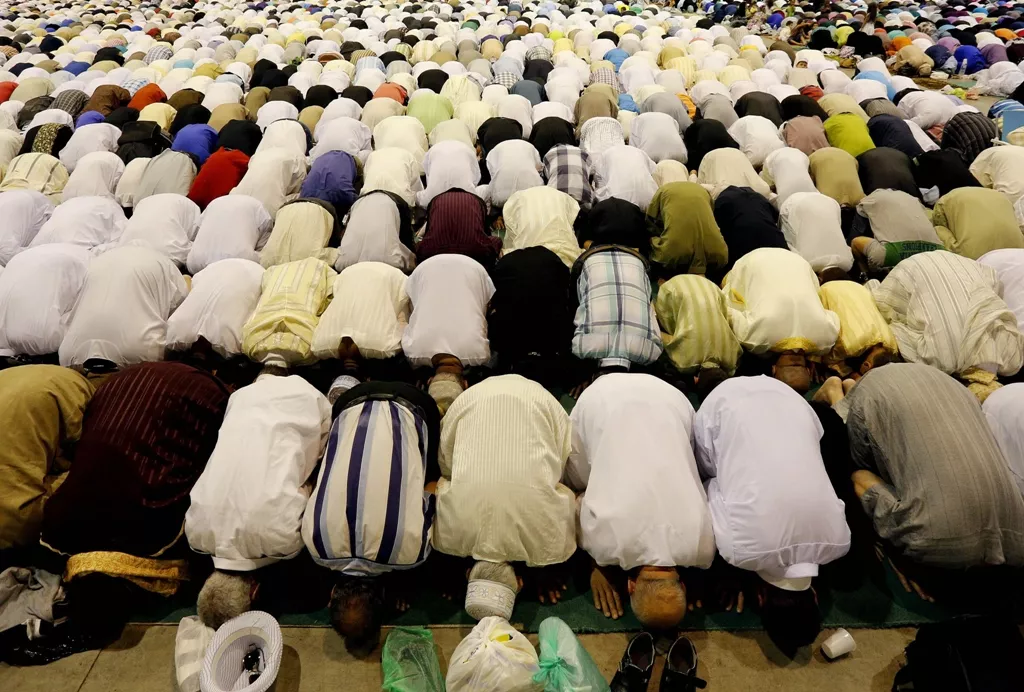No handshakes or hugs on Eid
NCOC also recommends small Eid congregations, brief sermons
ISLAMABAD:In an effort to curb the transmission of the novel coronavirus, the country’s apex body leading the fight against the deadly pandemic has approved guidelines for the upcoming festival of Eidul Fitr, recommending congregations at open spaces, brief sermons by Ulema and Khateebs, mandatory wearing of masks and maintaining social distancing rules.
The National Command and Operation Centre (NCOC) gave the nod of approval to the new guidelines during a meeting co-chaired by Planning Minister Asad Umar and Chief Coordinator Lt Gen Hamooduz Zaman Khan.
It has already announced a weeklong Eid holidays, closure of shopping malls and tourist spots, and a ban on inter-city and intra-city public transport.
Read Pakistan records 3,447 new Covid-19 cases, 78 deaths in 24 hours
The slew of new measures were triggered by the third wave of Covid-19, the deadly respiratory disease caused by the novel coronavirus, which saw a spike in fresh infections and deaths.
In its meeting, the NCOC reviewed mobility control measures being implemented countrywide during the Eid holidays stretching from May 8th to 16th. The forum called on people for greater national resolve by adhering to the safety protocols to contain the pandemic.
In a statement after the meeting, the NCOC said that Eid prayers should be organised at open spaces with Covid protocols. If there is a compulsion to offer the prayers in mosques, windows and doors should be kept open for ventilation.
It proposed two to three Eid congregations at one venue with staggered timings to minimise attendance while keeping the Eid sermons brief in order to reduce the prayer timings exposure. The guidelines discourage the sick, the elderly and children under 15 years of age from attending the prayers.
Wearing of face or surgical mask has been made mandatory, while congregation organisers have been asked to arrange multiple entry-exit points at the Eid congregation venues to avoid jumbling up of individuals, install thermal screening at entry points and make hand sanitisers available at the entry-exit points.
Worshippers have been urged to perform Wuzu at home, bring their own prayer mats, observe six-foot social distancing rules at the venue, avoid hugging and handshakes or stay at the venue after the prayers.
The organisers have been told to put up banners at prominent places at the congregation venue, highlighting Covid protocols for worshippers. The guidelines further stipulate that well laid-out parking areas should be prepared for crowd management.
The Eid guidelines have been issued to minimise the risk of the spread of Covid-19 which is raging in the South Asian region. In Pakistan the third wave, fuelled by the UK strain of the novel coronavirus started in March, when the single-day caseload soared past 5,000 during the month of April.
However, since the start of May, daily infections are on the decline, showing that the NCOC measures are yielding results. On Tuesday, the single-day tally remained below 4,000 for third day in a row, but the daily death toll hovered above 100.
According to the daily updates released by NCOC, 3,084 people tested positive for Covid-19, showing a positivity ratio of 7.93%, which was more than 9% in April. It added that the nationwide death toll topped 19,000.
Nationwide active cases declined from more 80,000 on Monday to 78,959 after 4,387 people recovered during the last 24 hours. Among the active cases, 5,353 patients were admitted to various hospitals, including 607 on ventilators.
The NCOC also reported 113 fatalities during the past 24 hours. It said that 95 patients died in hospitals, including 49 on ventilators. Most of the deaths, 67, occurred in Punjab, followed by 29 in Khyber-Pakhtunkhwa. The nationwide death toll stood at 19,106.
Vaccination campaign
The NCOC rolled out vaccine in February this year, with frontline health workers getting the jabs on priority. The campaign was gradually expanded to different age groups, starting from the elderly citizens. Currently, the authorities are inoculating people over 40 years of age.
Read more CAA takes notice of inbound passengers with fake Covid PCR test reports
Asad Umar, the NCOC chief, said on Tuesday that the government was coming closer to allowing vaccination of the younger people. “Starting tomorrow, the 12th of May, all 40-plus who have registered will be able to walk into any vaccination center of their choice and get vaccinated. Please note that vaccination centres are open and will only be closing for two days on Eid,” Umar tweeted.
“The risk of death from coronavirus increases with age, therefore, the focus of vaccination campaign is on the protecting the most vulnerable segments of society first. “[That’s the] Reason why we are opening vaccination based on age in descending order,” he added.
Umar said that only 7% of Pakistan’s population is above the age of 60 and 53% of all Covid deaths have been in this age bracket. “Conversely, 77% of Pakistan’s population is below the age of 40 and only 9% of total Covid deaths in Pakistan have been in this age bracket.”
The minister stressed that the government was making "concerted efforts" to increase the supply of vaccines as well as expand the vaccination capacity, adding that the government was opening vaccinations based on age in descending order "due to finite availability of vaccines globally, as well as vaccination capacity in the country".


COMMENTS
Comments are moderated and generally will be posted if they are on-topic and not abusive.
For more information, please see our Comments FAQ